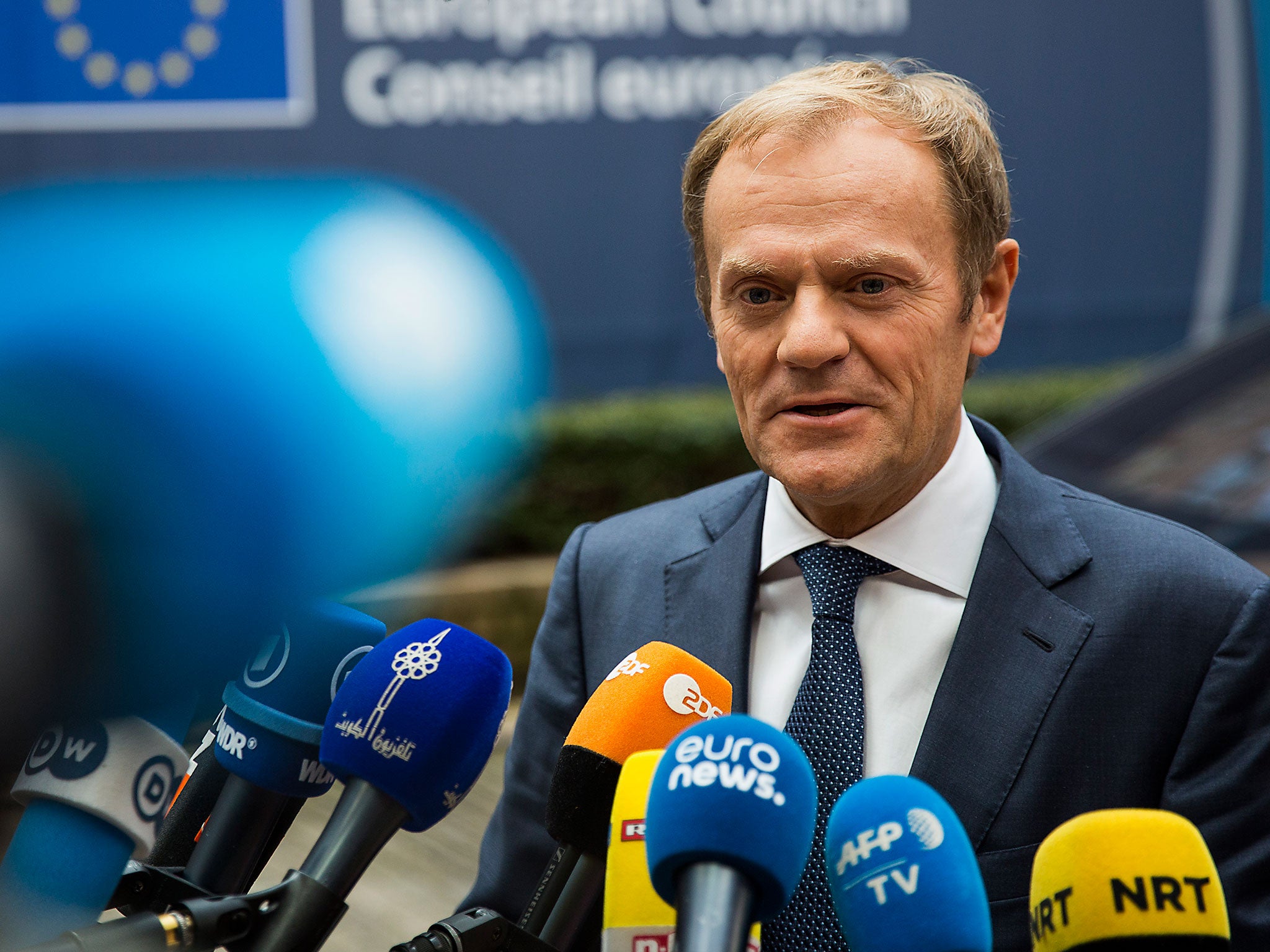Hard Brexit would cost EU £8bn more than Britain every year
EU companies would have to pay £13 billion year in tariffs compared to £5 billion for British firms, says thinktank

Your support helps us to tell the story
From reproductive rights to climate change to Big Tech, The Independent is on the ground when the story is developing. Whether it's investigating the financials of Elon Musk's pro-Trump PAC or producing our latest documentary, 'The A Word', which shines a light on the American women fighting for reproductive rights, we know how important it is to parse out the facts from the messaging.
At such a critical moment in US history, we need reporters on the ground. Your donation allows us to keep sending journalists to speak to both sides of the story.
The Independent is trusted by Americans across the entire political spectrum. And unlike many other quality news outlets, we choose not to lock Americans out of our reporting and analysis with paywalls. We believe quality journalism should be available to everyone, paid for by those who can afford it.
Your support makes all the difference.A “hard” Brexit would cost businesses in European Union countries £8 billion per year more than British companies, according to new analysis by the thinktank Civitas.
Companies in other EU member states would face annual tariffs of £13 billion compared to a much lower bill of £5.2 billion for British firms, should Britain leave the EU without having agreed a trade deal.
Businesses in all but five EU states would face greater costs on exports to the UK than British firms trading in the other direction.
German companies would be faced with £3.4 billion of levies each year, while French businesses would have an annual bill of £1.4 billion. Firms in Ireland, Spain, Netherlands and Belgium would all have to pay more than £1 billion per year in tariffs in order to export goods to Britain.
The finding will be welcomed by UK government ministers, who hope to highlight to their EU counterparts that a stormy Brexit would damage the rest of the EU as well as Britain.
EU leaders have repeatedly made it clear that Britain will not be able to dictate the terms of its withdrawal from the EU.
Theresa May faced a difficult first European Council meeting as Prime Minister as she was told the UK would have to pay the price for opting to leave the union. Donald Tusk, the Council’s president, said the only options facing the UK were "hard Brexit" or "no Brexit". Reports also suggested Mrs May’s request that EU leaders stop meeting without her present was firmly rebuffed by Mr Tusk.
Civitas said its latest findings “highlight the importance of a trade deal for both the UK and for EU countries”.
Justin Protts, Economics and EU Research Fellow at Civitas, who conducted the analysis, told The Independent: “There is a rational economic argument for some kind of free trade deal. I would imagine eventually pragmatism will win through and [governments] will realise that a trade deal is beneficial to everyone. “
“Businesses exporting from Europe face costs of £13 billion in UK tariffs which will go to the UK government. In return, UK businesses will face a cost of £5 billion worth of tarrifs."
“Damage to businesses will be greater than that for both the EU and the UK. Therefore both sides would benefit from keeping free trade and keeping the supply chain as in tact as possible, because any tarrifs that are introduced will be damaging to both sides.”
On the whole UK firms would face proportionally higher export tariffs than EU companies, but because the UK imports more than it exports it is the EU that would face the greatest bill.
Only companies in Croatia, Cyprus, Estonia, Greece and Malta would pay less than the British firms they trade with.
The research also reveals that manufacturers and farmers are likely to be hit hardest by Brexit. UK and EU companies exporting vehicles, meat and dairy produce will face the greatest costs should trade tariffs be introduced.
Levies of 40% could hit EU exporters of dairy produce, while UK businesses selling tobacco and tobacco substitutes would face a charge of 44 per cent.
It comes as reports suggest ministers are preparing to cut the UK's corporation tax rate by half in order to force the hand of other EU states. Supporters believe such a cut could keep companies in the UK and attract new businesses, diverting investment from other countries.
Fears about a possible UK trade deal with the EU were fuelled when the Belgian region of Wallonia blocked a proposed EU trade agreement with Canada, raising the prospect of a UK deal also being vetoed.
But Cabinet minister and Brexit supporter Chris Grayling said he did not believe a trade deal with the UK would be rejected.
The Transport Secretary told the BBC: “I think there is a very different question with our relationship with the European Union. We are their most important export market…Nobody in continental Europe benefits from a reduction in the ability to trade with the United Kingdom. “
Join our commenting forum
Join thought-provoking conversations, follow other Independent readers and see their replies
Comments